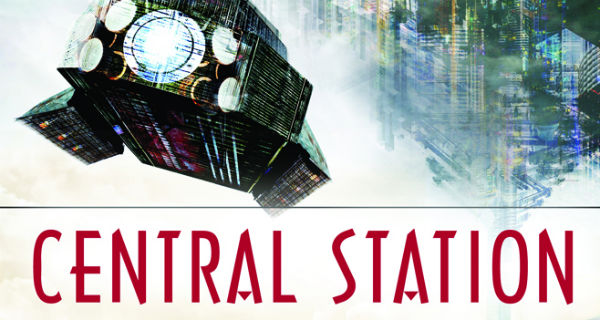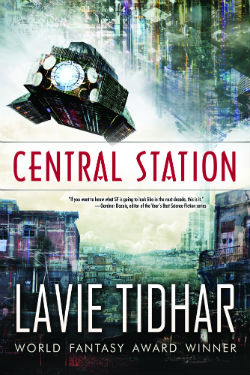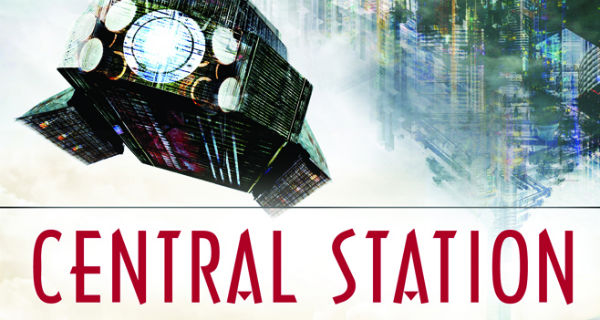Review of Central Station by Lavie Tidhar

Zafrir Grossman’s review of Lavie Tidhar’s new book, Central Station, scheduled to come out this May.
As the Israeli band Teapacks (Also known as Tippex) beautifully described in its song, “A different state” from 1995, the old central station of Tel Aviv was indeed a different state, a fascinating and indescribable combination of spices, vendors of shoes and car radios of dubious origins (partly stolen partly salvaged by fearless pirates), a cinema with even more dubious movies and tedious and long waits in roofless platforms during the summer and winter. For this intrepid Haifa dweller writer, who had to board on buses from broken platforms during the 1980s, the memories are not extremely pleasant, and this is why I was overjoyed when in 1993, the new central station was built, a wet dream which included excellent video game arcade, CD shops (with counterfeit CDs created by pirates of a different kind), and a bakery shop with the best cheesecake known to man. But this place too—as seems to be the destiny of any huge transportation hub—gave birth to a brave and new underworld, which emerged in its murky depths. Homeless and vagrants have attached themselves like lichen to the walls of abandoned stores and a community of runaway teenagers found solace in its confines. Immigrant workers from all over Africa and Asia started to flock to it, and the area inside and around the station had gradually started to change its appearance and spirit.
This new spirit also resides in Lavie Tidhar’s new novel “Central Station”. We return to visit Tel Aviv’s new central station, but now it is a station in the remote future. This central station where the new spaceport is established, equipped with the huge elevator which transfers people from the low-orbit Gateway station to Earth. But the world we know is no longer recognizable. The world has continued on and the Internet has become “The conversation”, a network that can be accessed using a node, which is implemented inside a fetus’s body, so each human is connected to it from birth and is never alone. The conflict between Israel and Palestine has ended long ago, and most ideologists chose to practice their Kibbutz dream in the arid wastelands of Mars and leave divided Israel behind. The area surrounding the station is populated with the descendants of the work immigrants who flocked to Israel with hopes of a better future, but found themselves shackled, physically and mentally, to that same central station. Among these people, we can find Miriam Jones, also known as Mama Jones, a descendant of immigrants of Jewish and African origins, who manages the local shebeen for the locals, her brother Achimwene, the book dealer, who purposely disconnected himself from The Conversation and searches for antique paperbacks, Isobel Cho, who prefers to spend most of her time inside the VR game “Guilds of Ashkelon” and exits only at nights to spend time with Motl, her robotnik lover, a semi-human war machine , still remembering its fighting days in the Sinai desert, and Ibrahim, the Alte Zachen man, who rides on his horse-driven cart, from Palestinian neighborhood, Ajami, to the rest of Israeli Tel Aviv territories, even though people are willing to swear that he is doing it for several centuries.

First and foremost, Central Station is an Israeli science fiction book, which is surprising since Lavie Tidhar does not live in Israel for many years. But the spirit of Tel Aviv and its surrounding area is still very familiar in his writing. Central Station is perhaps the most ambitious Israeli science fiction book ever written, and can even be compared to Dan Simmons’s Hyperion Cantos. The book is a series of stories told from the different points of views of multiple characters, from Ibrahim, through Mama Jones, Isobel, Motl, and other surprising characters. Through these various perspectives the readers get to view a fascinating mosaic of a known, but still unfamiliar, world. The world-building is rich and intricate and it seems the novel only scratches the surface. The historical details we receive are sketchy, and although many facts are hinted at in the text, most of the history remains in the fog of time. It is also evident that Lavie continues to explore and reference old and new speculative pulp Israeli novels, as he has already done in the book he has written along with Nir Yaniv in Fictional Murder. He gives one of his characters the name Boris Chong, which is reminiscent of the protagonist of Yoav Avni’s book, Chong Levi’s Fifth, who is also a son of immigrants. He also mentions Israeli vampire novels, such as Vered Tochterman’s Blue Blood and Gal Amir’s Red night (which also receives the title of “The First Israeli Vampire Novel”), which survive the passage of time and are sold for preposterous prices. Other pulp fiction series, such as Patrick Kim – The Karate Man, and Ringo, the dauntless gunfighter from the Wild West, an almost mythical figure in Israel, also get love and recognition. Tidhar already had a literary rendezvous with pulp fiction in previous novels, such as Osama and A Man Lies Dreaming, and seems to enjoy every minute of it.
Central Station is also a novel about identity. While in contemporary Israel, and also in pre-election USA, it seems that extremists get occupy the center of the stage, Central Station shows us a softened and more tolerant point of view. While the meek work immigrants have inherited the area of the central station, Neve Sha’anan, and Jaffa has become one of the most prominent Palestinian cities, moving between the adjacent cities is performed without any difficulty, without borders or fear, and although prejudices and fears still exist, they are now targeted at a different kind of “others” – artificial intelligences which free to evolve in the cyber space, and yet some suspect they are already beginning to probe their into the physical world. The separation between Jews and Arabs no longer exists, and both can sit in Mama Jones’s little shebeen and drink arak, but look crossly from the corner of the eyes on the poor robotniks, sitting in street corners, begging for alms and spare parts, and victims of addiction to a drug, which gives meaning to their existence.
This is not a book for the casual reader, but whomever decides to stick with it, will enjoy it immensely. Its plot would have made Aristotle pull his hair out. It is not linear and requires the reader’s constant concentration. It does not have a single or a couple of protagonists, but a myriad of characters, and there is no major conflict. What it does have is have is fascinating view into a piece of life in a futuristic version of Tel Aviv, as a city which has forgotten its essence in an Earth which is no longer the center of creation, in a universe which in turn contains much more. And maybe the real protagonist of this novel is the central station, a tall monument like the Eiffel Tower, always visible in the corner of one’s eye, but standing tall and ugly like the center of a Ferris wheel, with people around it connected to it like spokes, trying to hide and get away from it, but never really managing to exit its borders and leave the small world they have created, or even to gather up the power of will required to do it. Like a dark reflection of our time, a place which shows the people residing in it that they can “check out” in order to go anywhere they wish, but they can never leave.
Central Station
Author: Lavie Tidhar
Publisher: Tachyon (May 2016)
Number of pages: 240





